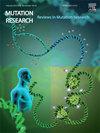APOC1, transcriptionally regulated by FOXM1, promotes M2 macrophage polarization and cervical cancer progression
IF 1.5
4区 医学
Q4 BIOTECHNOLOGY & APPLIED MICROBIOLOGY
Mutation Research-Fundamental and Molecular Mechanisms of Mutagenesis
Pub Date : 2025-01-01
DOI:10.1016/j.mrfmmm.2025.111904
引用次数: 0
Abstract
Background
Cervical cancer (CC) is a common malignant tumor in women. M2 macrophages are associated with tumor growth, metastasis, and immunosuppression. Apolipoprotein C1 (APOC1) has been confirmed as an oncogene in CC. However, the role and mechanism of APOC1 in CC progression and M2 macrophages remain to be elucidated.
Methods
The effects of APOC1 on CC cell malignant phenotypes were examined by CCK-8, colony formation, wound healing, and transwell assays in vitro and mice transplant tumor model in vivo. M2 macrophage polarization was assessed by qRT-PCR and flow cytometry assays. The interaction between APOC1 and forkhead box M1 (FOXM1) was determined using chromatin immunoprecipitation (ChIP) and luciferase reporter assays.
Results
The expression of APOC1 and FOXM1 was upregulated in CC tissues and cells. Knockdown of APOC1 or FOXM1 resulted in the inhibition of cell proliferation, migration, invasion, and EMT. Moreover, the polarization of M2 macrophages was attenuated when APOC1 or FOXM1 was silenced. Mechanistically, FOXM1 transcriptionally activated APOC1 by binding to its promoter. Furthermore, overexpression of APOC1 reversed the inhibitory effects of FOXM1 knockdown on cell proliferation, metastasis, and M2 macrophage polarization. Additionally, the knockdown of APOC1 reduced tumor growth and M2 macrophage polarization in mice.
Conclusion
FOXM1/APOC1 axis is involved in the progression of CC and the regulation of M2 macrophages polarization, bringing new hope to the treatment of CC.
FOXM1转录调控的APOC1促进M2巨噬细胞极化和宫颈癌进展
宫颈癌(CC)是女性常见的恶性肿瘤。M2巨噬细胞与肿瘤生长、转移和免疫抑制有关。载脂蛋白C1 (APOC1)已被证实是CC的致癌基因,但APOC1在CC进展和M2巨噬细胞中的作用和机制仍有待阐明。方法采用体外CCK-8、菌落形成、创面愈合、transwell实验及小鼠移植瘤模型检测APOC1对CC细胞恶性表型的影响。采用qRT-PCR和流式细胞术检测M2巨噬细胞极化情况。采用染色质免疫沉淀法(ChIP)和荧光素酶报告基因法测定APOC1与叉头盒M1 (FOXM1)之间的相互作用。结果CC组织和细胞中APOC1和FOXM1表达上调。敲低APOC1或FOXM1导致细胞增殖、迁移、侵袭和EMT受到抑制。此外,当APOC1或FOXM1被沉默时,M2巨噬细胞的极化减弱。机制上,FOXM1通过结合其启动子转录激活了APOC1。此外,APOC1的过表达逆转了FOXM1敲低对细胞增殖、转移和M2巨噬细胞极化的抑制作用。此外,敲低APOC1可降低小鼠肿瘤生长和M2巨噬细胞极化。结论foxm1 /APOC1轴参与了CC的发展和M2巨噬细胞极化的调控,为CC的治疗带来了新的希望。
本文章由计算机程序翻译,如有差异,请以英文原文为准。
求助全文
约1分钟内获得全文
求助全文
来源期刊
CiteScore
4.90
自引率
0.00%
发文量
24
审稿时长
51 days
期刊介绍:
Mutation Research (MR) provides a platform for publishing all aspects of DNA mutations and epimutations, from basic evolutionary aspects to translational applications in genetic and epigenetic diagnostics and therapy. Mutations are defined as all possible alterations in DNA sequence and sequence organization, from point mutations to genome structural variation, chromosomal aberrations and aneuploidy. Epimutations are defined as alterations in the epigenome, i.e., changes in DNA methylation, histone modification and small regulatory RNAs.
MR publishes articles in the following areas:
Of special interest are basic mechanisms through which DNA damage and mutations impact development and differentiation, stem cell biology and cell fate in general, including various forms of cell death and cellular senescence.
The study of genome instability in human molecular epidemiology and in relation to complex phenotypes, such as human disease, is considered a growing area of importance.
Mechanisms of (epi)mutation induction, for example, during DNA repair, replication or recombination; novel methods of (epi)mutation detection, with a focus on ultra-high-throughput sequencing.
Landscape of somatic mutations and epimutations in cancer and aging.
Role of de novo mutations in human disease and aging; mutations in population genomics.
Interactions between mutations and epimutations.
The role of epimutations in chromatin structure and function.
Mitochondrial DNA mutations and their consequences in terms of human disease and aging.
Novel ways to generate mutations and epimutations in cell lines and animal models.

 求助内容:
求助内容: 应助结果提醒方式:
应助结果提醒方式:


